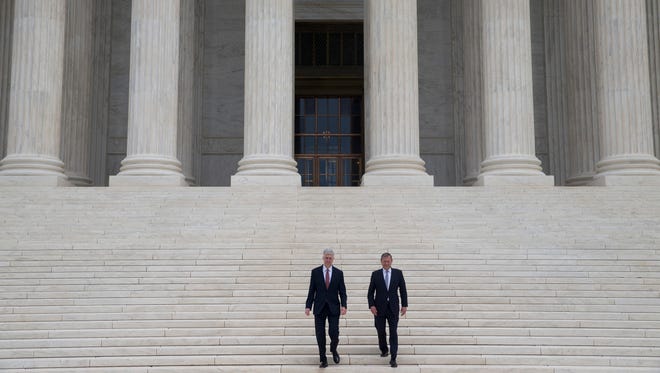Twelve top cases from the Supreme Court's term
 Richard Wolf
Richard WolfWASHINGTON — The Supreme Court term that ended Monday lacked the blockbuster cases of recent years, but a mostly shorthanded court still resolved some difficult issues. Here are a dozen of them:

Church-state separation
Trinity Lutheran Church of Columbia v. Comer
Argued April 19, decided June 26
The justices ruled 7-2 that Missouri stretched the constitutional separation of church and state too far by declaring a Lutheran church ineligible to receive a competitive state grant for playground resurfacing. That means religious institutions are entitled to compete for public funds, at least for secular purposes.
Derogatory trademarks
Matal v. Tam
Argued Jan. 18, decided June 19
In a unanimous decision, the court said even trademarks considered to be derogatory deserve First Amendment protection. It was a victory for an Asian-American dance rock band dubbed The Slants — and, in all likelihood, for the Washington Redskins, whose trademarks were canceled in 2014 following complaints from Native Americans.
Immigrants' rights
Ziglar v. Abbasi
Argued Jan. 18, decided June 19
In a case heard by only six justices, the court's conservative majority ruled 4-2 that Bush administration officials cannot be held personally liable for the detention and harsh treatment of illegal immigrants in the days after the 9/11 terrorist attacks. Only Congress can assess monetary damages, the court said.
Housing discrimination
Bank of America Corp. v. City of Miami
Argued Nov. 6, decided May 1
Chief Justice John Roberts joined the court's four liberals in a 5-3 ruling that cities can sue banks for discriminatory mortgage lending practices — if they can show that predatory loans led to financial damages, such as lost tax revenue and higher spending on municipal services. The decision was a partial victory for the city of Miami.
Special education
Endrew F. v. Douglas County School District
Argued Jan. 11, decided March 22
In a unanimous opinion by Chief Justice John Roberts, the court ruled that the Individuals with Disabilities Education Act requires school districts to offer each child a program that is "appropriately ambitious in light of his circumstances." That raises the bar from the "more than de minimus" standard some courts had accepted.
Election districts
Cooper v. Harris
Argued Dec. 5, decided May 22
The court ruled 5-3 that racial considerations pervaded the way North Carolina lawmakers drew congressional maps after the 2010 Census in order to maximize Republicans' advantage. The court also struck down state legislature maps there and demanded new lower court review of state legislature districts in Virginia.
Death penalty
Buck v. Davis
Argued Oct. 5, decided Feb. 22
The justices set aside the death sentence of a Texas murderer because of racially discriminatory testimony presented by his own defense team. The 6-2 ruling was one of several death penalty cases decided in favor of condemned prisoners this term, though the justices also allowed several executions to go forward.
Jury bias
Pena-Rodriguez v. Colorado
Argued Oct. 11, decided March 6
The court ruled 5-3 that jury verdicts can be thrown out even following convictions if racial discrimination is discovered. The majority said a juror's bias against Mexicans, revealed during private deliberations, can be taken into consideration despite state and federal rules protecting the sanctity of the jury room.
Insider trading
Salman v. United States
Argued Oct. 5, decided Dec. 6
In a unanimous decision, the justices ruled that tips passed between relatives and friends are illegal even if the corporate insider receives no financial benefit. That upended a legal standard set by a New York-based federal appeals court in 2014 that had made prosecutions more difficult.
Design patents
Samsung Electronics Co. v. Apple
Argued Oct. 11, decided Dec. 6
The justices ruled unanimously that Samsung may not owe Apple the full profits from smartphones that copied iPhone design features, including the shape and colorful icons. It ordered a lower court to judge the infringement based on individual components, rather than the entire products.
Government takings
Murr v. Wisconsin
Argued March 20, decided June 23
In a case watched closely by property rights groups, the court ruled 5-3 that the owners of a cottage in Wisconsin were not entitled to compensation over development regulations that bar the sale of the family's adjacent lot. The majority said lower courts correctly analyzed the issue as one concerning a single parcel.
Social network access
Packingham v. North Carolina
Argued Feb. 27, decided June 19
Standing firmly behind the First Amendment, the justices ruled unanimously that even registered sex offenders deserve access to social networking websites. A North Carolina law that made it a felony for them to go on sites such as Facebook and Snapchat went too far, they said.
Read more:
For Supreme Court, the term that just ended was the calm before the storm